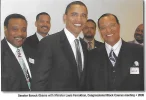Obama's, or McCains?
It really depends on where you are on the poor to wealthy continuum: If your income exceeds $600,000 a year, then you'd like McCain's tax proposal best. If you're under $250,000 then Obamas would help you more.
Of course, there is the question of whether it is fair to ask wealthy citizens to pay more, where you stand on redistribution of wealth and whether the tax proposals actually are such a redistribution, whether you subscribe to the trickle down theory, and of course, which proposal would exacerbate the deficit most.
It seems that neither candidate is really serious about a balanced budget.
Here is the rest of the story.
McCain, borrowing a page from Ronald Reagan and President Bush, would keep tax rates low for higher-income taxpayers and slash rates for corporations, arguing that this is the way to jump-start a lethargic economy and create more jobs.
Obama, focusing on a theme of many past Democratic campaigns, seeks to target his help to the squeezed middle class and address the growing income inequality between rich and poor. He would retain all of the Bush tax cuts for families making less than $250,000 a year, but would do away with Bush's cuts for people making more than that.
Since neither party wants to go back to the tax rates in effect before 2001, whoever wins will have to work with Congress to pass legislation shaping how the tax code will look beyond 2010. At stake will be billions of dollars.
Under Obama, the wealthiest 1 percent of taxpayers, those making roughly $600,000 or more, would see their taxes go up on average by $93,709 in 2009, according to an analysis done by the Tax Policy Center, because Obama would begin implementing his tax changes even before the scheduled expiration of the Bush cuts.
Under McCain, those same taxpayers would see an average reduction of $48,860, reflecting in part additional cuts he is proposing.
By contrast, the bottom 20 percent of taxpayers, those with taxable income of roughly $19,000 per year or less, would see their taxes cut by an average of $567 under Obama's program and $21 under McCain's plan, the tax center estimates.
It really depends on where you are on the poor to wealthy continuum: If your income exceeds $600,000 a year, then you'd like McCain's tax proposal best. If you're under $250,000 then Obamas would help you more.
Of course, there is the question of whether it is fair to ask wealthy citizens to pay more, where you stand on redistribution of wealth and whether the tax proposals actually are such a redistribution, whether you subscribe to the trickle down theory, and of course, which proposal would exacerbate the deficit most.
It seems that neither candidate is really serious about a balanced budget.
Here is the rest of the story.

![relaxing-outside-smiley-emoticon[1].gif relaxing-outside-smiley-emoticon[1].gif](https://www.houseofpolitics.com/data/attachments/6/6496-581aa3adf5fd8cf2efe03ad431d1514e.jpg?hash=WBqjrfX9jP)





![Four_Presidents-1[1].webp Four_Presidents-1[1].webp](https://www.houseofpolitics.com/data/attachments/6/6548-9e3dc58aa329840d67ca2536c64c3fa7.jpg?hash=GIMgFGVauM)



![relaxing-outside-smiley-emoticon[1].gif relaxing-outside-smiley-emoticon[1].gif](https://www.houseofpolitics.com/data/attachments/8/8748-581aa3adf5fd8cf2efe03ad431d1514e.jpg?hash=WBqjrfX9jP)